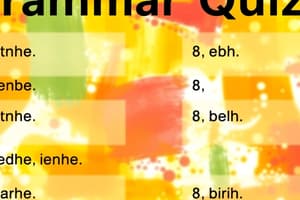Podcast
Questions and Answers
Which tense is used for habitual actions and general truths?
Which tense is used for habitual actions and general truths?
- Present Continuous
- Future Perfect
- Simple Present (correct)
- Present Perfect
What is the formula for the Present Perfect tense?
What is the formula for the Present Perfect tense?
- Subject + have/has + Past Participle (correct)
- Subject + am/is/are + Verb-ing
- Subject + had + been + Verb-ing
- Subject + will + Base Verb
Which of the following keywords is associated with the Simple Past tense?
Which of the following keywords is associated with the Simple Past tense?
- Now
- Yesterday (correct)
- For
- By the time
Which tense is used for actions that are in progress at a specific time in the past?
Which tense is used for actions that are in progress at a specific time in the past?
What phrase indicates an action that started in the past and continues to the present?
What phrase indicates an action that started in the past and continues to the present?
Which tense completes actions before a specific time in the future?
Which tense completes actions before a specific time in the future?
Which of the following shows an action ongoing before another action in the past?
Which of the following shows an action ongoing before another action in the past?
What is the formula for forming the Future Perfect Continuous tense?
What is the formula for forming the Future Perfect Continuous tense?
Flashcards
Simple Present Tense
Simple Present Tense
Used for actions that happen repeatedly or are generally true. Uses the base form of the verb, adding 's' or 'es' for the third person singular.
Present Continuous Tense
Present Continuous Tense
Describes actions happening right now or around now. Uses 'am/is/are' + verb ending in '-ing'.
Present Perfect Tense
Present Perfect Tense
Used for actions completed at an unspecified time in the past, but relevant to the present. Uses 'have/has' + past participle.
Present Perfect Continuous Tense
Present Perfect Continuous Tense
Signup and view all the flashcards
Simple Past Tense
Simple Past Tense
Signup and view all the flashcards
Past Continuous Tense
Past Continuous Tense
Signup and view all the flashcards
Past Perfect Tense
Past Perfect Tense
Signup and view all the flashcards
Past Perfect Continuous Tense
Past Perfect Continuous Tense
Signup and view all the flashcards
Study Notes
English Tenses
-
Simple Present: Used for habitual actions and general truths. Formula: Subject + base verb (add -s or -es for 3rd person singular). Keywords: always, usually, often, never. Example: She reads books every day.
-
Present Continuous: Used for actions happening now or around now. Formula: Subject + am/is/are + verb-ing. Keywords: now, at the moment, currently. Example: They are playing soccer now.
-
Present Perfect: Used for actions completed at an unspecified time or relevant to the present. Formula: Subject + have/has + past participle. Keywords: just, already, yet, ever, never. Example: I have finished my homework.
-
Present Perfect Continuous: Used for actions started in the past and continuing to the present. Formula: Subject + have/has + been + verb-ing. Keywords: for, since, recently, lately. Example: She has been working for two hours.
-
Simple Past: Used for completed actions in the past. Formula: Subject + past verb. Keywords: yesterday, last week, ago. Example: He visited Paris last year.
-
Past Continuous: Used for actions in progress at a specific time in the past. Formula: Subject + was/were + verb-ing. Keywords: while, when, as. Example: They were eating dinner at 8 PM.
-
Past Perfect: Used for actions completed before another action in the past. Formula: Subject + had + past participle. Keywords: before, after, by the time. Example: She had left before I arrived.
-
Past Perfect Continuous: Used for actions ongoing before another action in the past. Formula: Subject + had + been + verb-ing. Keywords: for, since, before. Example: He had been studying for hours.
-
Simple Future: Used for actions that will happen in the future. Formula: Subject + will + base verb. Keywords: tomorrow, next week, soon. Example: I will call you tomorrow.
-
Future Continuous: Used for actions in progress at a specific time in the future. Formula: Subject + will + be + verb-ing. Keywords: at this time, by this time. Example: She will be traveling at 9 AM.
-
Future Perfect: Used for actions completed before a specific time in the future. Formula: Subject + will + have + past participle. Keywords: by, by the time, before. Example: They will have finished by noon.
-
Future Perfect Continuous: Used for actions ongoing up to a specific time in the future. Formula: Subject + will + have + been + verb-ing. Keywords: for, by, by the time. Example: I will have been working for 5 hours.
Studying That Suits You
Use AI to generate personalized quizzes and flashcards to suit your learning preferences.




